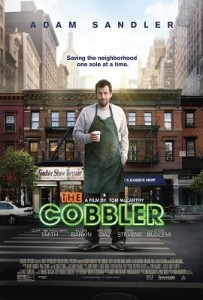Copyright Owner Denied Attorneys’ Fees In Suit Against Popcorn Time User–Cobbler v. Doe
 This lawsuit involves the unauthorized download of a 2015 Adam Sandler movie, The Cobbler. The court says The Cobbler has been illegally downloaded 10,000 times in Oregon alone. WTF? I can’t wrap my head around the fact *anyone* chose to download this particular movie; it has a 9% rating at Rotten Tomatoes. Watching grass grow sounds more enjoyable. And query whether or not being publicly outed as someone who voluntarily downloaded The Cobbler is more embarrassing than being outed as a porn downloader. It seems weird that anyone would need the disincentive of a major copyright lawsuit as an additional multitudinous reason not to download The Cobbler.
This lawsuit involves the unauthorized download of a 2015 Adam Sandler movie, The Cobbler. The court says The Cobbler has been illegally downloaded 10,000 times in Oregon alone. WTF? I can’t wrap my head around the fact *anyone* chose to download this particular movie; it has a 9% rating at Rotten Tomatoes. Watching grass grow sounds more enjoyable. And query whether or not being publicly outed as someone who voluntarily downloaded The Cobbler is more embarrassing than being outed as a porn downloader. It seems weird that anyone would need the disincentive of a major copyright lawsuit as an additional multitudinous reason not to download The Cobbler.
In this case, one of The Cobbler’s downloaders agreed to a consent judgment agreeing to the minimum statutory damages of $750. The court adds $190.20 of costs. What’s left is for the court to decide the copyright owner’s request for $4,700 of attorneys’ fees. The court, applying the latest Supreme Court guidance from Kirtsaeng, concludes: “In light of the totality of circumstances, the Court concludes that fee shifting is inappropriate in this case.”
The court says a copyright owner’s effective success in any single download enforcement case is minimal. First, the $750 damages is a small fraction of the $4,700 fee request. Second, just stopping one of 10,000 downloads is a de minimis result. So, “[o]n balance, the degree of success Plaintiff has achieved as the prevailing party in this litigation does not warrant requiring Defendant to fund in toto Plaintiff’s enforcement of its copyright.”
In light of the $750 damages, the court says “a financial penalty of that magnitude is sufficient to deter Defendant, as well as others, from illegally downloading movies in the future” without an attorneys’ fee award as well. “[N]or is a fee award necessary to encourage Plaintiff to continue to protect its rights, where Plaintiff has been vigilant to date and clearly has the resources to police its copyright.” (I’ll come back to the copyright owner’s incentives in the absence of attorneys fee shifts in a moment).
The court also worries that a fee shift motivates copyright trolling. “In these BitTorrent copyright cases, the threat of fee-shifting has emboldened Plaintiff’s counsel to demand thousands of dollars to settle a claim, even where the infringing defendant admits early in the case that they illegally downloaded the movie.” A footnote adds: “In some cases, Plaintiff has pursued particularly vulnerable individuals. See, e.g., Cobbler Nevada, LLC v. Gonzales, No. 3:15-cv–00866-SB (targeting an adult group foster care home); Cobbler Nevada, LLC v. Snapp, No. 3:15-cv-01768-SB (targeting a woman living on Social Security disability benefits).” The court says enough is enough:
The Copyright Act, as it is being enforced in these BitTorrent cases, has created results inconsistent with the goals of the Act….For this Court to award Plaintiff its attorney fees in this case would only contribute to the continued overaggressive assertion and negotiation of these Copyright Act claims.
This ruling gives us another chance to consider if copyright trolling can ever be profitable. I last considered that question in detail with respect to Righthaven. You may recall Righthaven’s brilliant plan to sue mom-and-pop bloggers for republishing newspaper articles. Not surprisingly, this failed horribly: the settlement amounts were low (and many of the targeted defendants were judgment-proof); defendants had strong fair use defenses, even on a motion to dismiss; and eventually Righthaven started getting 505 fee shifts against it, putting its profit-meter into reverse.
The Popcorn Time/BitTorrent download enforcement actions look different in court than Righthaven’s campaign, including the possibility of defendant joinder (though courts sometimes resist this), the lower odds of a successful fair use defense, the higher likelihood of a plaintiff win and the concomitant reduced risk of a 505 fee shift against the plaintiff, and the potential risk of defendant public unmasking that defendants may be anxious to avoid.
Still, when the court denies the plaintiff’s attorneys’ fees, the economics of that specific enforcement lawsuit look terrible. In this case, the plaintiff had to stake $400 for the complaint filing fee (although when the court lets a plaintiff name multiple defendants in the same suit, that cost gets spread across all of the defendants) to get a $750 payoff. (I’m ignoring court’s award of costs, which should be profit-neutral to the plaintiff; but in fact the plaintiff may have had more out-of-pocket costs that didn’t get awarded). If the full $400 filing fee applied to this defendant, the copyright owner made a $350 “profit” from the suit at the (alleged) cost of $4,700 of attorneys’ fees. I may be math-challenged, but that doesn’t sound like a good deal for the plaintiff. Indeed, the likely losses suffered by the plaintiff in this case erodes the putative profits it made from the more cost-effective non-litigated settlements.
So this raises the same questions we wondered in the Righthaven scenario (and before that, the RIAA litigation campaign): is it possible to run a wide-scale copyright enforcement campaign profitably? This ruling doesn’t answer the question definitively, but it adds to my suspicion that the economics don’t make sense.
Case citation: Cobbler Nevada LLC v. Does 1-11, 3:15-cv-01550-SB (D. Oregon Aug. 10, 2016)
